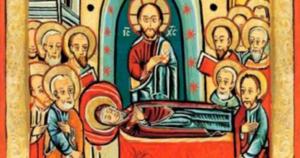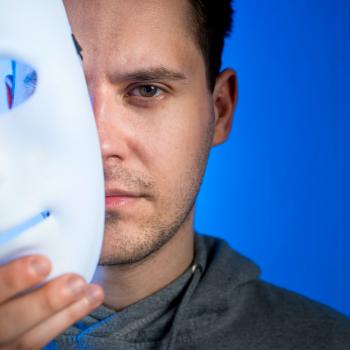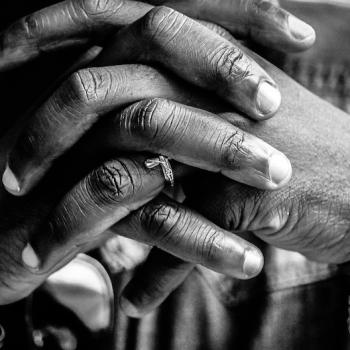Unless your mother was the Mother of God, then she will have had her faults. My Mom, grand lady that she is, may also have some faults, but if so piety suggests I not share them here.
Why would I?
The Church does not teach that she is without sin. Why would I state the obvious? Given her essential decency and comparative excellence to all other moms but one, why would I natter?
I suppose it might prove that I am not unaware of faults, but who imagines this is true of any child?
Mom gets the big things right, I love her, and honor her. She may not be perfect, yet I love her. I am, and have been, deeply imperfect, yet she loves me.
So love acts toward all beloveds, all the objects of love, from the most trivial of affections (Go Pack Go!) to some of the most profound (God bless America!). Our loves are not perfect, may even be deeply flawed, but they are our own.
One reason I am Orthodox (beyond the fact that it is true, good and beautiful) is that every service reminds me that even the great saints, with few exceptions, were flawed. Constantine the Great was magnificent, dying in the odor of holiness, but not at all perfect. One can accept the truth of the historian, one must accept the truths of the historian, and still venerate him for what was “godward” in his life.
This is very simple, but even the highly credentialed can miss this basic lesson. We are patriots, loving our nation, not because we think her history uncluttered with sins, both original and recent, but because she is our own motherland. No American can think our nation sinless. We mourn as every prayer of national repentance and thanksgiving has done. Lincoln understood: God cannot be wholly on our side, we hope to find our way to God’s. If she is our own motherland, then we cannot escape our shared history.
We would not do so. We stand with Her her wrongs to right, her virtues to praise.
And so it is with the One Holy Catholic and Apostolic Church.
We come to the Church, because she is visibly pure, holy, good, full of truth, and beautiful.
This is a visible and invisible reality.
Yet the Church herself teaches us, shows us, reminds us, that this Church is no escape from history, but the affirmation of history. Nothing is so good in itself that men cannot corrupt it. In the name of that great glorious Church, bad men have done bad things. That is easy enough to see from the pogroms to serfdom.
The Church forces us, liturgically with great rigor, to recognize that the best us of us must pray: “Lord Jesus Christ have mercy on me a sinner.”
This is terrifically helpful as we never dodge the hard reality of history, because our faith teaches us not to do so. Yet simultaneously we can see the good done, the real glory, the splendor of truth. Accepting all that can be rightly said of the short comings of her members, yet we love Her.
I have yet to meet a Christian in my tradition who does not know that whatever nation he or she calls home that this nation has had her faults, her great faults.
This lesson applies to so many good things. Education? Classical education is education, but that too has a mixed history.
Recently, I spoke, and mostly learned, at a most excellent conference on classical education in America. (Thank you Professor Prather!) Nobody involved in American classical education can think, for a moment, that this is an entrance or escape from America’s faults. Even so rich a tradition has been perverted and misused, even to this day. Dr. Prather, the leader of the conference, gathered scholars who refused to give up the tradition to the failures. They saw the good and doubled down on the good.
Classical education is not an escape from history, but an attempt to embrace all the truth we can stand. Classical education has been and is used for evil, but yet we love her.
Why?
We love the dialectic. We love the search for truth. We love the great works of art, texts, and the science created. We love physical and metaphysical reality. Classical education has been our alma mater to liberty from Socrates to Frederick Douglass. We will not let our beloved by defined by her misuse. We are not American to escape vice, America has her own. We care not classical educators to escape error, but to learn how better to avoid errors of our own. We are not Orthodox to escape repentance, but to gain the ability to repent well.
We do not love America, our schools, our families, our Church to escape from history, but to heal history of her wounds.
The liturgy is an Avalon moment, where the noble Lady, carries our spent selves to a place where we can rest. We do not enter this Sabbath rest to escape, but to prepare for a return there to heal the beloved land of her evils.
All and all, truth being known, of all the beloveds home, nation, and altar: yet we love Her.

















